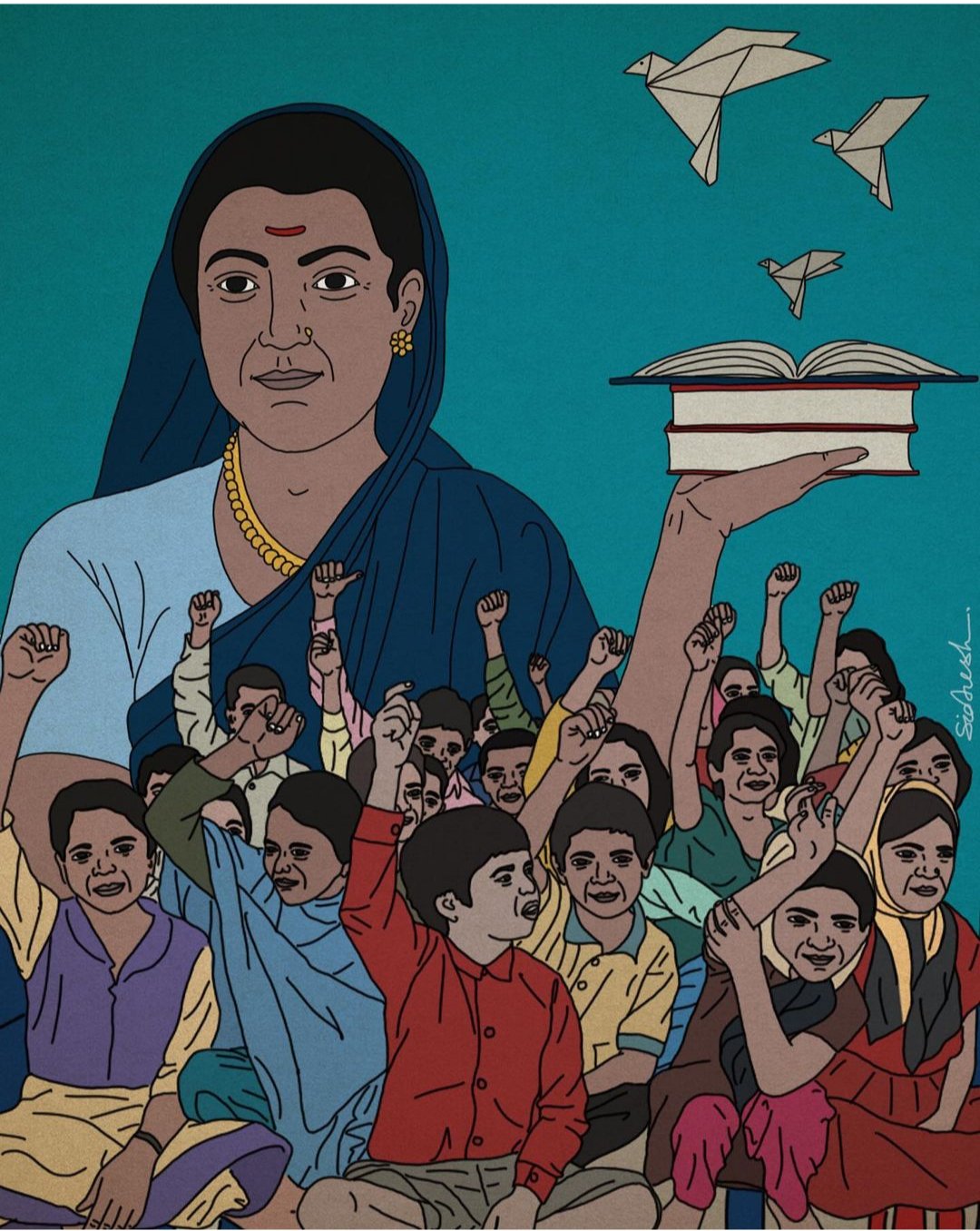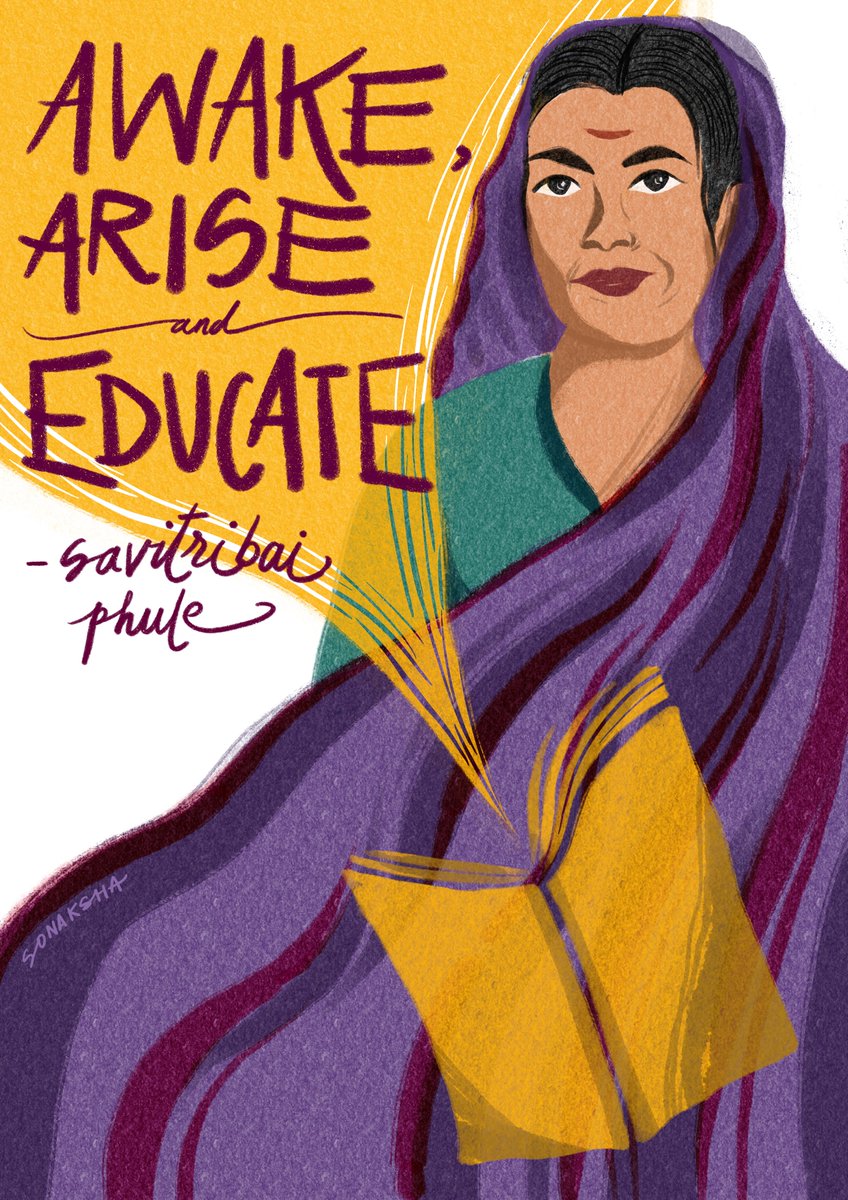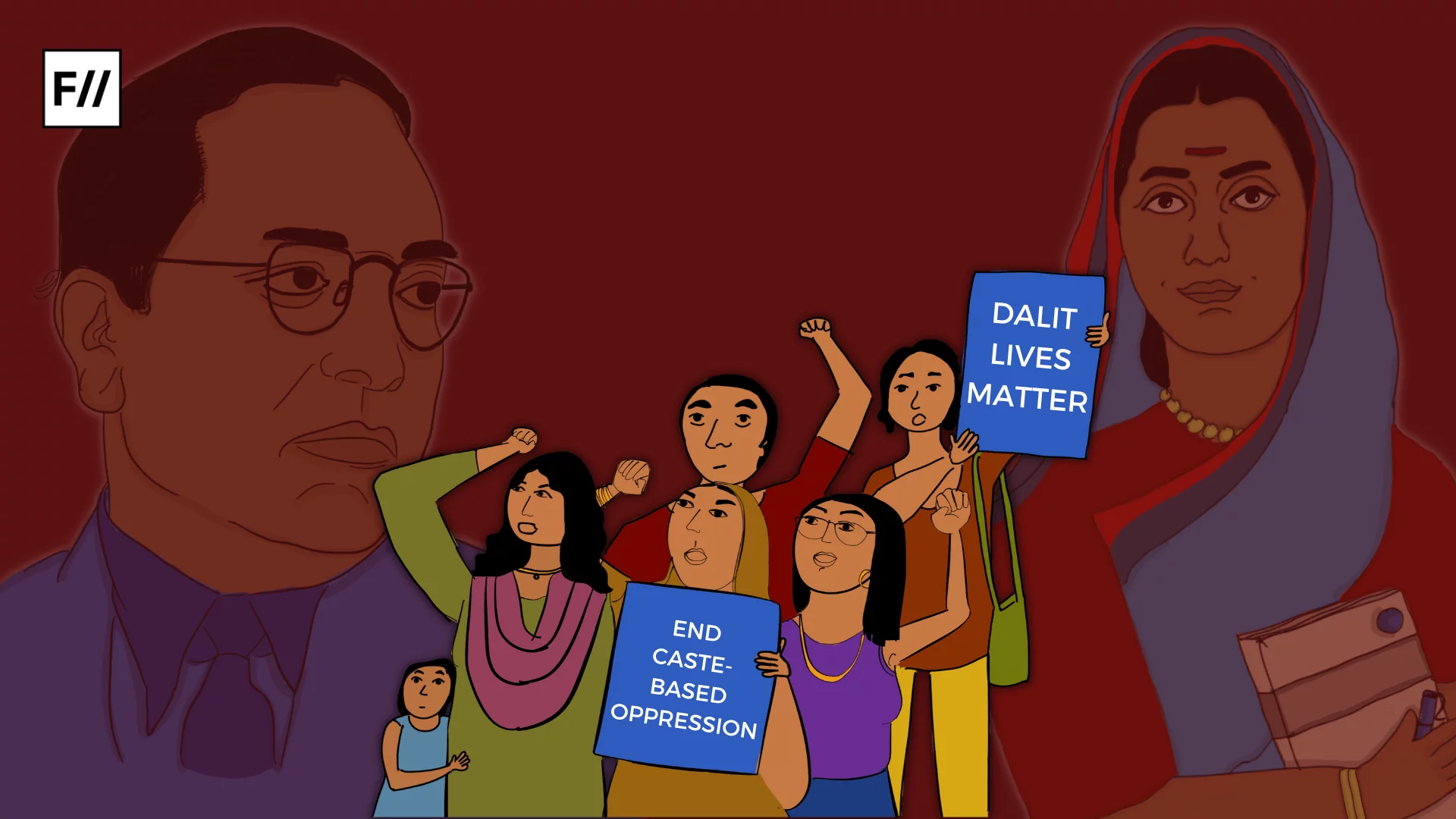The Phule-Ambedkarite Movement for Dalit rights largely conceived of a struggle and upliftment of the Bahujan community that predominantly involved women’s education and emancipation. Phule, Ambedkar and the larger Dalit community urged women to again every possible education to develop self-esteem, self-confidence, determinacy and daring in order to channel their agency effectively towards cleansing the community as well as striking at the roots of caste and gender oppression.
One such firebrand intellectual and pioneer was Savitribai Phule(1831-1897). Known for her influential anti-caste literature and contribution towards women’s education, Savitribai Phule’s political activism reveals that the Dalit’s struggle for education, equality, freedom and power is intimately connected with the politics of radically remaking Dalit women as historical agents and transgressive subjects of social reform.
Born on January 3rd, 1831 in the Naigaon village of Satara in Maharashtra, Savitribai Phule was a prominent figure in the social reform movements of Maharashtra. She was married to Jyotirao Phule at the age of nine and then on, the couple together, as well as individually, emerged as leading voices of the Dalit movement of the 19th century. Savitrimai’s education started after her marriage. It was Jyotirao Phule who taught her how to read and write. She obtained her higher education and received training as a teacher for Ms. Farrar’s Institution in Ahmednagar, Maharashtra.
Today marks the 190th birth anniversary of Savitribai Phule and a salutation to her relentless struggle for women’s emancipation in India. Both Jyotiba and Savitribai were pioneers of inclusivity and diversity that we envisage in the education system of contemporary India. Their approach to education is a striking reminder and challenge to the upper-caste hegemony prevalent within 21st century modern India.
Further, from the case of the Phules it is evident that the Dalit political discourse of the 19th century abandoned the false dichotomies of the private and the public. In the process, the imagination of a family with its social and political relations made home a political space and reforming women and gender was critical to the discourse of Dalit emancipation.
Dalit women’s construction as ‘custodians’ of the community also reinforced their creative and social role as ‘subjects’ of social reform. Thus, the question of women’s liberation was central to the programmes and initiatives undertaken by the movement. It is also argued that by centering on women’s education and self-making, the Dalits departed from the elite Brahmanical norms which were initially against women’s education. Savitribai Phule and Jyotirao Phule worked collectively to open educational institutions for women, Shudras and Dalits during the late 19th century.
Savitribai’s collection of poems, called Kavyaphule was published in 1854, when no work of Jyotirao Phule had seen the light of the day. But despite this, her prolific writing and literary work is less spoken about. In her poetry, Savitribai comes across as a proud wife/lover, loving mother, teacher and social thinker. She was the first poetess of India who was inspired by the modern values of humanism, fraternity, nationalism and scientific thinking. These were precisely the values that formed the foundation of Dr Ambedkar’s battle for Dalits – the battle through which he sought to establish and promote social harmony. In that sense, Savitribai’s poems are where the struggles of the Bahujans and Bahujan literature originated. Savitribai’s poems portray her love for education, family and labour

Unlike most upper-caste women, Dalit women did not write for published magazines of their own during that period. Hence, the recent recognition given to Savitribai Phule as ‘Krantijyoti’ or the ‘Light of Revolution’ not only honors her extraordinary work in the field of education, but also signals her powerful, richly layered and strident political thought that she expressed through her writings, which included a few poems and letters to her husband Jyotirao Phule.
Reinforcing Mahatma Phule’s efforts, Savitrimai employed Jyotiba’s conception of the ‘Tritiya Ratna’ derived from his political play. The ‘third jewel’(tritiya ratna) that Phule spoke about sought to identify knowledge as a jewel for the emancipation of Dalit women and the community at large. The understanding of such a metaphor would allow Dalit women to critically examine the oppressive social relations and multiple operations of Brahmanical hegemony.
Along with her husband, Savitribai underscored the significance of challenging caste endogamy and also suggested an anti-caste, Bahujan alliance of all women and Shudras and Ati-Shudras against Brahmanism. The Phules thus challenged brahmanical practices as they discriminated against oppressed castes and restricted the sexuality of dominant-caste women. In an essay titled The Stuff Legends are Made Of published in the book A Forgotten Liberator, author Cynthia Stephen writes: “The young couple faced severe opposition from almost all sections. Savitribai was subject to intense harassment everyday as she walked to the school. Stones, mud and dirt were flung at her as she passed.”
Undeterred, she began to carry a sari to school to change into, and continued to teach. Eventually, she and Jyotirao opened several schools for adults, agriculturalists and laborers. In 1852, she started the Mahila Seva Mandal to fight for the rights of women. She organised a strike against barbers in Pune and Mumbai, putting pressure on them to stop shaving the heads of Brahmin widows. Hence, it is evident that the political strife lead by the Phules not only aimed for the emancipation of Dalit women but also challenged the Brahmanical practices that were detrimental to the welfare of all sections of women.
Also read: The Life And Times Of Dnyanjyoti Krantijyoti Savitribai Phule | #IndianWomenInHistory
Savitribai’s collection of poems, called Kavyaphule was published in 1854, when no work of Jyotirao Phule had seen the light of the day. But despite this, her prolific writing and literary work is less spoken about. In her poetry, Savitribai comes across as a proud wife/lover, loving mother, teacher and social thinker. She was the first poetess of India who was inspired by the modern values of humanism, fraternity, nationalism and scientific thinking.
These were precisely the values that formed the foundation of Dr Ambedkar’s battle for Dalits – the battle through which he sought to establish and promote social harmony. In that sense, Savitribai’s poems are where the struggles of the Bahujans and Bahujan literature originated. Savitribai’s poems portray her love for education, family and labour.
The complexities of Dalit women’s subjectivities as both victims and agents, as well as their struggle against victimhood shaped their lives and agency. Unlike middle class, dominant-caste women, Dalit women have never figured as historical accounts in the anti-colonial nationalist struggle in the mainstream documentation of gender reforms. Today, it is in this context that we reminisce the life and struggles of Savitribai Phule

Inspired by Savitribai’s advocacy, Muktabai Salve, a 14-year-old Mang girl in Phule’s classroom in 1855, wrote about the ‘Grief of Mang-Mahars’. In her essay, Muktabai exposes the deep social stratification in the society and criticises Brahmanical domination. She also questions God’s deployment of caste differentiation: ‘You have given the Vedas to Brahmans and nothing to us?’, she write. She further examined the caste violence inflicted by the Brahmins onto Mang-Mahars, using ‘Mang-Mahars’ as a combined community. Most significantly, Muktabai laments the oppressed castes’ exclusion from specific forms of textual knowledge. In fact, she ends her essay by pleading to Mang- Mahars to study hard in order to open their ‘tritiya ratna’ as advocated by Phule.
It is important to note that the cultural anxiety of the Dalits combined with the agendas of modernity and education, while conforming to certain dominant caste, middle class ideas and practices, are radically departed from them in many ways. Instead of dwelling on merely modernising, the Dalits sought to democratise and emphasise on egalitarian gender relations and undercut privilege.
Savitribai, who was ahead of her time, did not submit to the Brahmanical imagination of a woman whose life was strongly and solely driven by her maternal instincts. Instead, she assigned agency and autonomy to the personhood of women, recognising women as a marginalised identity within the Indian society.
Also read: A Tribute To Savitribai Phule’s Radical Writings

Shailaja Paik in her chapter on ‘Dalit Women’s Agency and Phule-Ambedkarite Feminism’ writes that the Dalits negotiated with the liberal-rationalist view of modernity and transformed its meaning to serve their own political and social purposes. By emphasising equality between different castes and genders, they engaged in practices of democratisation and went beyond merely modernising and creating a ‘liberal’ space for middle-class women
The complexities of Dalit women’s subjectivities as both victims and agents, as well as their struggle against victimhood shaped their lives and agency. Unlike middle class, dominant-caste women, Dalit women have never figured as historical accounts in the anti-colonial nationalist struggle in the mainstream documentation of gender reforms. Today, it is in this context that we reminisce the life and struggles of Savitribai Phule.
As Braj Ranjan Mani rightly puts it, “Savitribai Phule (1831-97), struggled and suffered with her revolutionary husband in an equal measure, but remains obscured due to casteist and sexist negligence. Apart from her identity as Jotirao Phule’s wife, she is little known even in academia. Modern India’s first woman teacher, a radical exponent of mass and female education, a champion of women’s liberation, a pioneer of engaged poetry, a courageous mass leader who took on the forces of caste and patriarchy certainly had her independent identity and contribution. It is indeed a measure of the ruthlessness of elite-controlled knowledge-production that a figure as important as Savitribai Phule fails to find any mention in the history of modern India. Her life and struggle deserves to be appreciated by a wider spectrum, and made known to non-Marathi people as well.”
Reference:
- Dalit Feminist Theory – A Reader, edited by Sunaina Arya and Aakash Singh Rathore
Featured Image Illustration: Siddhesh Gautam
About the author(s)
Mansi Bhalerao is an Ambedkarite feminist, an undergraduate at Miranda House. She is an aspiring student of Sociology, trying to navigate and assert her praxis.






Not long after beginning to teach with Sagunabai, Savitribai and Jyotirao Phule along with Sagunabai started their own school at Bhide Wada. Bhide Wada was the home of Tatya Saheb Bhide, who was inspired by the work that the trio was doing.